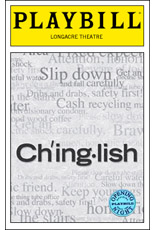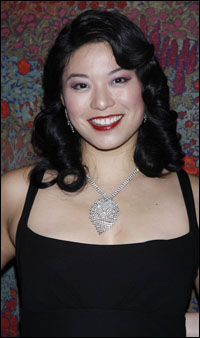
*
At the Longacre, starting Oct. 27 with the arrival of Chinglish, Mandarin 101 is spoken here — but panic not: subtitles are splattered all over the sets to keep the audience amusingly aware of the words that go wildly awry when East meets West.
What we have here is a failure to communicate — a funny failure, coming from a man of double vision and two different worlds, David Henry Hwang. Like Joni Mitchell, he sees both sides now — and, from that tricky spot, how easily communication between countries slips between the Carlsbad Cavern-sized cracks. His play begins with a slideshow of signs illustrating what gets lost in translation: "Chief Financial Officer" comes out "Financial Affairs Is Everywhere Long." There are more groaners where this came from in the presentation that a Cleveland sign-maker makes to the cultural minister of Guiyang, China. It's a persuasive pitch, and he deserves the job, but — what's the Mandarin word for nepotism? — the minister's missus keeps telling him that her sister should do the honors, and what a loud, universal language that is! So the minister dispatches a sexy aide to give the Yank a polite kiss-off. The kiss-off gets too polite and hatches all sorts of intrigues.
It's a long time between Longacres for Hwang, whose last straight Broadway play, Golden Child, put in 69 performances there in 1998, but Chinglish makes it a happy homecoming, he admitted at the after-party that followed at the elegant and expansive Brasserie 8½, marked with a big red 9 on West 57th Street.
"It's very gratifying to sit at the back of the house when there's so much laughter," he confessed, beaming from ear to ear. "I feel laughter opens people up a little, and they can accept some ideas and think about things. To see Chinese and Americans laughing together is very satisfying." An Asian-American born in L.A., Hwang got the idea for this play as a stranger in the strange land of his ancestors. "I've been going to China a fair amount [over the] last five or six years — to talk about Broadway shows, really — and on one occasion I was taken to this new cultural center in Shanghai," the playwright remembered. "It was gorgeous, except for the really bad translated signs — a handicapped restroom is 'a deformed man's toilet' — and I began to think about that as a jumping-off point to write a play about doing business in China, and one that would deal with the issue of language. I hadn't really seen that tackled in a show before. When I started writing it, all I knew was that the American would want the deal at the beginning of the play, and at the end he would get what he wants — but not for the right reasons."
Trying to reach a sensible middle-ground from two different language points is a treacherous tightrope walk, doubly so when the translator drops the ball with an interpretation that's too literal or totally off-the-wall. Much of the fun of the play is unknown to the characters on stage, but supertitles write it on the wall for the audience — a clever brainstorm of the play's director, Leigh Silverman.
"I don't think I've seen it — certainly to this extent — in a play," said Hwang. "Of course, I imagined the play with these titles when I was writing it, but it was really Leigh who figured out, 'We should just directly project these titles onto the set. That way the audience doesn't have to always be looking up and down. They can watch the action of the play and read the titles at the same time the way you do in a film.'"
"David and I don't speak Chinese so we had to have a translator, a Hong Kong-based playwright in her own right, who came in and served as our translator on the show and did all the translations," Silverman said, agreeing the project turned into something of international production. I like to say, 'This play took a village.'"
She's well aware of the long gestation period of Chinglish. "When David and I were working on Yellow Face together at The Public a few years ago, he told me he had a new idea for a brand-new play about a businessman who goes to China. He said, 'Some of it is going to be in Chinese, I think. I don't know.' I said, 'Write it. Just write it. We'll do a reading. We'll see what it's going to be.' He wrote the first act, and I thought, 'This thing is going to be spectacular. We have to do it.'
The play came out in a dizzy swirl of short scenes, and David Korins' inventive scenic design kept the furniture flying and gave the opus an almost filmic flow. The atmospheric scene-change music is by Lee-Hon Wang, a very popular artist in China, who actually hails from Rochester, NY. According to Chinamerica Hit Radio's Steve Warren, "David introduced Lee-Hon's music to the show's sound designer who decided to use some songs for the scene changes."
Angela Lin, who briefly appeared in Coram Boy and Top Girls, is the one actor in the cast of seven not making a Broadway debut.
And Gary Wilmes, replacing James Waterston, is the lone New York hire in the cast that premiered the piece in June at Chicago's Goodman Theatre. Generically friendly and befuddled, he's the American innocent aboard, a hapless Everyman hopelessly lost in the Chinese of it all. His game attempt at pitching woo in another tongue brings the language barrier down to man-woman basics, and how his amorously-meant inflections missed the mark are writ large on the wall.

Buy this Limited Collector's Edition |
Christine Lin enjoyed her moment as one of the many faulty translators. "It's such a thrill to hear the audience — how they feel and how they react," she said.
Johnny Wu essayed another translator — and, to his surprise, a judge. "I had only auditioned for the translator role, which is an early-20s guy, and then I found out I was going to be doubling as the judge," Wu recalled, "and I thought, 'Oh, man, I don't know if I can really play that old or go for that sort of feel,' but, as I started rehearsing and working on the play, I understood what they were going for in terms of representing The New China and youth and new ideas. It works."
He happens to be pretty fluent in Mandarin, as is most of the cast. "They found actors who could really not only speak it but really speak it with a level of confidence that is required to make this show feel like the real thing."
A highly appropriate and prestigious first-nighter was Ang Lee, the Oscar-winning director of "Brokeback Mountain." It turns out he has been a fan of Hwang's since M. Butterfly — and a classmate of Mrs. Hwang (Kathryn Layng). Hwang's Tony-winning M. Butterfly, BD Wong, who went on to 11 years of "Law & Order: SVU" as FBI psychiatrist Dr. George Huang, was crowing that he just started a new job, and it still allows him to play a doctor on television: "I play a grief counselor on 'Awake,' a new NBC show that'll be on in the spring."
Michael Feinstein was taking a break from promoting his new album which just (like, Oct. 26) came out. "'The Sinatra Project, Vol. II: The Good Life' is a salute to the '60s," he trilled. "It's the people he influenced, and the people who influenced him. Arrangements are by Bill Elliott, who recently did arrangements for Anything Goes."
 |
||
| Christine Lin |
||
| photo by Joseph Marzullo/WENN |
Chicago's Goodman Theatre was represented by director Robert Falls, who's currently preparing The Iceman Cometh for an April revival with Nathan Lane as Hickey and Brian Dennehy as Larry Slade. "It's going to be a wonderful challenge for Nathan," said Falls. "He's going to unleash his inner O'Neillian, which has always been there under the surface."
That infrequent first-nighter, Michael Riedel, gravitated like a moth to a flame to producer Dasha Epstein's table where the blonde centerpiece was Aileen Mehle. (You know her as Suzy [Knickerbocker], the Post gossip.)
"I just wrote a story for Architectural Digest because they just did my apartment, and they asked me to write the story," she said, "but I'm not writing anymore. Don't the deadlines kill you? I did it for so long I never wanted to write my name. Really! I mean, the deadlines did me in. I did it for so long. I started when I was, oh God, 40. It was not only the columns and the five-times-a-week, but the magazine articles and all that. I just thought I have to let go. I loved it. I had a good time, a really good time, but if somebody asks me, 'Do you want to write?' — I don't want to write."
The opening-night guest list was intense with Tony winners: David Hyde Pierce, A Chorus Line's Donna McKechnie, director Julie Taymor (with her other half, Oscar-winning composer Elliot Goldenthal), and the Tony-est of them all, Angela Lansbury — plus worthy nominees like Andre De Shields, Zeljko Ivanek, Deborah Rush and Raul Esparza.
Also:Richard Thomas, who's going into Standing on Ceremony; actor-director-writer-"it's a long story" Austin Pendleton; directors Michael Wilson andMichael Greif; producer Jean Doumanian, beaming over her Mountaintop box-office; Kate Mulgrew, whose Katharine Hepburn play, Tea at Five, is getting a one-night-only Charles Busch reading Nov. 28 at the Lucille Lortel; Oskar Eustis, "The Lion King" of The Public, where Hwang has done many plays.
Late party arrivals included LeRoy McClain, fresh from Milk Like Sugar, which he'll open Nov. 1 at Playwrights Horizons; the mother-daughter of Silverman's Well, Jayne Houdyshell and Lisa Kron — Houdyshell, fresh from Follies, and Kron, toiling over the lyrics and book of a musical of the graphic novel, "Fun House," with composer Jeanine Tesori; Bob Stillman, who's doing a reading of A Good Man by Ray Leslie and Philip Goodman ("He's only attracted to plays that, basically, bear his name").
View highlights from the show:







































